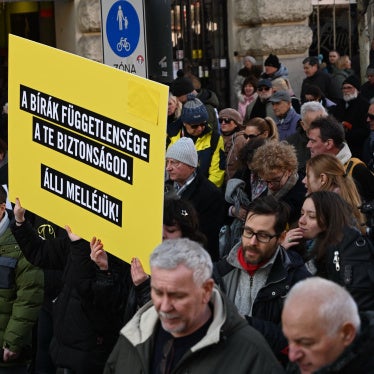ISTANBUL -- Now that Turkey's government has been swept from power, the international community is asking what the newly elected leaders mean for the future of human rights and especially Turkey's relationship with its European neighbors.
Sunday's elections capped a year of remarkable human rights progress in Turkey, with more advances than any year since the 1980 military coup. These included repeal of the death penalty, removal of some significant restraints on Kurdish and other minority language education and broadcasting, and a new draft law to guard against torture.
But more reforms are needed for Turkey to meet the European Union's "political criteria" for membership: the protection of human rights, rule of law and respect for minorities.
The Justice and Development Party, known by its Turkish initials as the AKP, won the polls by a surprisingly large margin. It ran on a platform that included basic rights protections. Its leader, Tayyip Erdogan, has himself been banned from joining Parliament because of a past conviction for the expression of non-violent opinion.
The election of a party whose president was stripped of his political rights is generally interpreted as the electorate's slap in the face for the state forces that manipulated the justice system to obtain his conviction and exclusion from the race.
Some Turkish commentators warn that the AKP's support stems from strongly nationalist and religious elements with a poor record on the protection of human rights. They suggest that this new conservative government's interest in human rights will evaporate once it has amended the law under which Erdogan was convicted and stripped of his political rights, and lifted the headscarf ban which prevents many devout Muslim women from attending university.
Both are indeed serious violations. But Turkey also faces a number of other human rights challenges, including restrictions on the press and free expression, unacceptable prison conditions and violations of the rights of the hundreds of thousands driven from their homes by security forces in their 15-year conflict with Kurdish separatists.
There is recognition at the highest levels that legal reforms are needed. Ahmet Necdet Sezer, a judge and former president of the constitutional court, was elected president of the Turkish Republic in May 2000 after making a series of bold speeches calling for the legal system to be "cleansed" of repressive features and "regulations of a police state."
Torture is still widespread. In August, Human Rights Watch wrote to the Turkish justice minister detailing 31 reports of torture involving 55 individuals since February 2002. In early October, the justice minister presented a draft torture-curbing law ensuring that all detainees get access to a lawyer from the first moment of detention.
In its Accession Partnership document, the EU called on Turkey "to undertake all necessary measures to reinforce the fight against torture." The EU specifically mentioned "aligning legal procedures concerning pre-trial detention with the provisions of the European Convention on Human Rights and with the recommendations of the Committee for the Prevention of Torture."
Turkey has committed to do so, but until now has not fulfilled this undertaking. If Turkey's new leaders want to send a clear message of separation from past human rights abuses, there could be no better first step than quickly to pass the anti-torture law already in draft form. It would signal to Turkish society, the EU and the international community the government's firm commitment to the human rights of all Turkish citizens.
How quickly can the torture reform be passed? The raft of major rights legislation was passed in record time this summer, in less than a week.
Moving swiftly to pass torture reform could even put Turkey's level of legal protection against torture ahead of several other European member states, giving the country some badly needed high ground as it pushes its candidacy for Europe.
The EU will make the key decision on setting a date for Turkey to join at its summit in Copenhagen next month. So time is short.
A law offers no protection unless it is implemented. One month may not be sufficient time to show a convincing statistical drop in torture allegations. The new government should ensure that during those four weeks lawyers can visit their clients in police custody in all cases and in even the most far-flung regions of the country. Thorough implementation in the first days and weeks would help to establish a firm expectation of such access in the minds of police and defense lawyers alike.
Turkey's sophisticated and educated society has chafed long enough at the threat of torture, along with paternalistic restrictions on freedom of expression, association, and religion. Swiftly adopting an agenda of rights reform will not only win Turkey kudos from the EU and abroad, but also at home.







